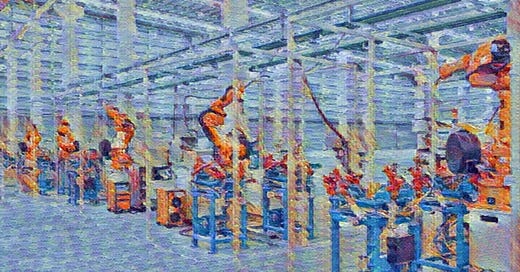Scarce Labor As The Cause Of Innovation
The Habakkuk thesis, Rome and the robotics revolution
In The Soul Of Man Under Socialism, Oscar Wilde famously wrote “The fact is that civilisation requires slaves. The Greeks were quite right there. Unless there are slaves to do the ugly, horrible, uninteresting work, culture and contemplation become almost impossible. Human slavery is wrong, insecure, and demoralising. On mechanical slavery, on the slavery of the machine, the future of the world depends.”
Many did not share Wilde’s optimism. We have been panicking about mechanisation - robots taking our jobs - for as long as mechanisation has existed. But that fear was based on the assumption of a stable or growing labor pool. What if population decline and thus a labor shortage is also happening?
The world is undergoing a population decline. Even with the best efforts of the cheap labor lobby, the limitless importation of vast replacement migrant labor populations will soon no longer even be possible as urbanization and modernization spread throughout the whole world. There will no longer be any exploding surplus labor populations from elsewhere to import. The Malthusian vision is sent into reverse and the new panic is that there won’t be enough people to keep the lights on. But there is one interesting line of thought about history that suggests this scarcity of labor could be cause for optimism, something to be adapted to first rather than delayed.
One theory on the cause of the fall of the Roman Empire is that it became reliant on the abundant cheap labor of the slaves. As well as causing discontent among the plebs, whose labor power was devalued, and the later slave revolts, abundant cheap labour meant that there was nothing compelling innovation in mechanisation and as a result no leap forward into the industrial revolution. Put simply, if you can get a hundred slaves to move a heavy object for free, you have no reason to invent a tractor to do it. Innovations did happen obviously but in other areas.
In 1932, J.R Hicks proposed in The Theory of Wages a theory of “induced innovation” that a "change in the relative prices of the factors of production is itself a spur to invention, and to invention of a particular kind—directed to economising the use of a factor which has become relatively expensive." In the case of labor, in other words, mechanical innovation occurs in response to scarce or expensive labor in order for industrialists to innovate around the problem. Whichever input becomes the most expensive will be the one that gets innovated on most radically by necessity.
In 1962 the British economist John Habakkuk published American and British Technology in the Nineteenth Century: The Search for Labor-Saving Inventions. His claim was that America innovated in such a radical way in the early 19th century, setting itself on a path to surpass all of Europe, in part because scarcity of labor compelled the search for labor saving inventions. This was one of the factors that led to the American system of manufacturing, he argued, with the most radical new forms of mechanization - "inventions of purely autonomous origin" - instead of the relatively conservative upgrades to existing industry seen elsewhere.
Already we can see the fruits of the labor shortage. The race is on to innovate in robotics and automation and we are seeing a worldwide rise in research and development. Simultaneously a tight labor market has enabled workers to demand more for what they do, as we are witnessing a historic rise in worker organising. Because of the population decline and the labor shortage, isn’t there less reason to fear the rise of the robots because there is no large surplus of labor to be easily replaced? Instead the trend we see is towards both more labor power and more innovation in mechanisation, which is making up for the population decline rather than causing large scale unemployment. The leader nations of the future will embrace the labor shortage as an opportunity to go all in on innovation early. Increased labor demands will accelerate it. There will be all kinds of unforseen problems too, no doubt, but optimistically we could be moving closer to the utopian dream Oscar Wilde once imagined.





Interesting to see you take a very different, optimistic take towards new technology to that taken by Paul Kingsnorth (who I know reads you as he's mentioned you). Would be great to get the two of you on a podcast talking about the two different perspectives. To be honest Paul's outlook is more than a little apocalyptic at the moment, maybe he could do with being cheered up!
I can't help think about Maslow's hierarchy of needs. When a person no longer needs to labour for survival are they going to skip ahead to self-actualization? Some do, some don't. Some turn into Cezanne, some turn into Hunter Biden.